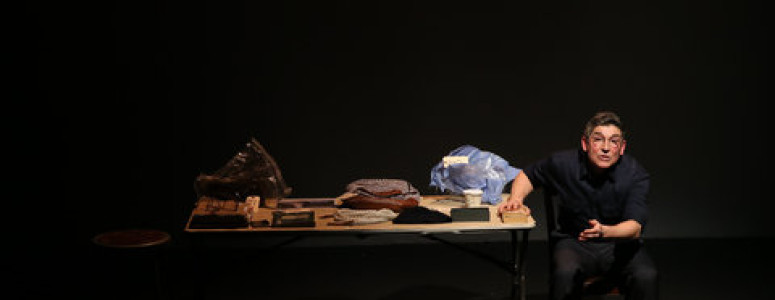“Right away I got that feeling that something was off,” says Chuck DeSantis, a New Jersey detective who knows that the Garden State does not include a Garden of Eden.
In James Lecesne’s play The Absolute Brightness of Leonard Pelkey DeSantis wastes no time in letting us what’s gone on. Leonard isn’t just a colorful fourteen year-old; he’s irrepressible. As one townsperson wryly puts it, “He knew how to dress a salad and the women in town.”
Leonard’s now has been missing for 19 hours … and now 24 … and now a few days. “I can’t take two steps without remembering that I wasn’t doing my job,” DeSantis grouses.
The owner of the hairdressing salon who’s been given charge of him (“He’s my brother’s ex-girlfriend’s son”) can’t bring herself to acknowledge that this showy lad might be gay. Her daughter can’t bring herself to believe otherwise.
Has Leonard been the victim of a gay-bashing or a hate-crime? Could he have run off to meet an Internet admirer, only to lead to God-knows-what? “Evil can happen anywhere,” DeSantis says, before almost quoting Shakespeare: “The evil men do lives after them; the good is oft interred along (sic) with their bones.”
All this suggests that we’re in for a whale of a murder mystery. That doesn’t occur. Whodunit buffs won’t be remotely satisfied; Lecesne’s play offers no moment where a tiny piece of information that had been casually mentioned an hour earlier turns out to be the all-revelatory key all. The play denies mystery mavens that head-slapping moment when they can exclaim “Oh, that’s marvelous!” while chiding themselves for not guessing or at least anticipating the solution. Let’s just say that The Absolute Brightness would have been judged none too bright by the readers who evaluate potential Law & Order scripts.
That, however, is not remotely the point of the enterprise, which happens to be a one-person show. And while it’s extraordinary, it’s not because Lecesne has considerable talent in playing more than a dozen characters and easily demarcating them for the audience. In a wonderfully subtle and unique way, The Absolute Brightness shows us how far our society has come in accepting the male who’s far less than conventionally masculine.
Yes, Leonard will turn out to have at least one enemy, but the remarkable thing is how many more townspeople like, love and admire him. Most don’t care a whit that he helped at the beauty salon and picked up the shorn hair from the floor and put it atop his puppets’ heads. So what if he cut the soles off a half-dozen different colored flip-flops and glued them to his sneakers? He was a lot nicer than at least two kids in town.
We’re left to infer that the gays who have been portrayed in mainstream media have helped. They’ve made people wish they knew someone fun and funny like that. As time has gone on, gays have been increasingly valued for their worth and not derided for their so-called deficiencies in standard-issue masculinity.
The proprietor of a local clock shop, when referring to his own youth, remembers when “No boy like this was allowed to exist.” If his own peers didn’t crucify him “his father would have beaten it out of him.” The man should know, as he divulges a profound revelation about his own family.
It may be the play’s most moving sequence, but there are plenty from which to choose. Nevertheless, the way that Tony Speciale has directed doesn’t tip off the audience that this won’t be a slam-bang comedy vehicle. Although Lecesne starts out as the no-nonsense DeSantis, his second character is that hairdresser who comes out with lines that are funnier than she knows. The audience starts laughing early and often, which makes Lecesne run the risk of having the crowd take the serious play away from him. Even when a flamboyant drama teacher (who was careful to mention that he’s wed to a woman) tells of once being accused of being a pedophile, Lecesne gets a laugh out of it. That the teacher describes Leonard as “special” before quickly adding that he doesn’t mean it in the developmentally challenged sense also gets a good guffaw.
But finally the crowd catches on and realizes that this is a serious work. Will the guilty be punished? There would have been a time that Leonard would have been castigated, ostracized and made to feel worthless. The Absolute Brightness of Leonard Pelkey will have you wondering if history will repeat itself. Perhaps “the evil that men do” will not live after them.
In the years to come when anthologies of 21st century gay plays are published, don’t be surprised if James Lecesne’s 80-minute monologue turns up in many or even all of them. It certainly deserves to, and deserves your attention.




